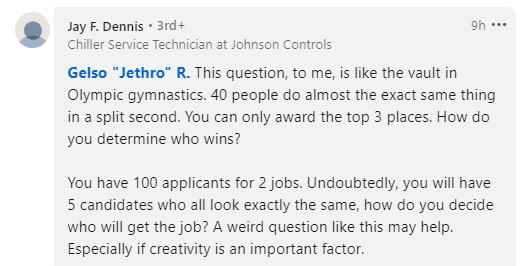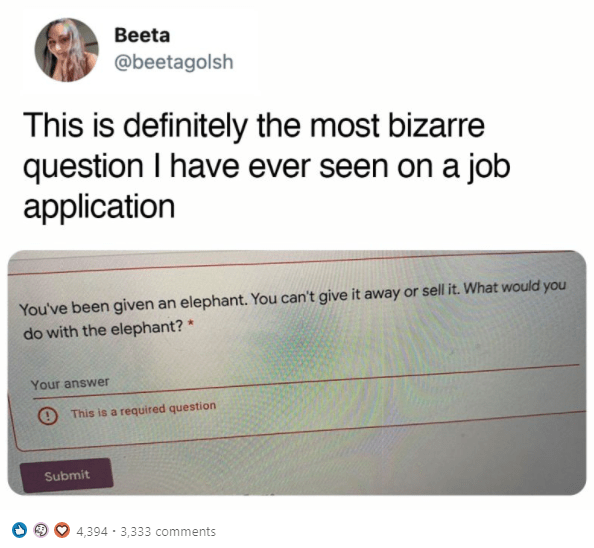The LinkedIn Elephant
The Organization
Organizations, or most successful organizations, are not static. To remain an ongoing concern the organization will need to adapt to identified opportunities. This will require growing the talent base, either organically, that is from within, or by finding talent external to the organization. From an external perspective, how do we know the right person when we meet them?
Interviews
Interviews are at least one of the mechanisms by which we ascertain talent. But that is not all that we are attempting to discern. Interviews are for the company’s benefit as well as the individual, sort of like a date, where we are exploring if we like each other enough to continue exploring or to our move to propose (well that got weird).
For the Company
Why do we interview people to be part of our team and our company at large? Well, we may need a greater volume of talent or to extend the diversity of our talent. By diversity, we mean a greater variety of skills, a wider range of skills and perspectives via experiences. There are several areas that we explore to find the appropriate talent:
- Technical skills
- Ability to learn
- Adaptability
- Fit with corporate culture
- Collaborative skills
- Problem-solving
- Creative thinking
For the Individual
From the individual’s perspective, interviews are the mechanism by which they learn about our company. They must peer through the veneer that we present, as we are putting our best foot forward. We should expect probing questions or questions that are unanticipated. Just like the company puts their best face forward, so to the individual.
Are some Questions Bizarre?
Earlier on LinkedIn, we saw the post below, presented as a question for a candidate in a job interview. I can honestly agree with the candidate, some questions are indeed bizarre. That aside, is there a point to it? To be sure this question has some point or is some attempt to get past that façade we put up when interviewed. In some cases, it is not easy to ask direct questions. Direct questions tip the interviewer’s hand, making it easy for the interviewee to articulate a favorable answer. A bizarre, or seemingly ridiculous questions can lead the interviewer to learn something that may be otherwise hidden.
So, what could possibly be the point of this bizarre question? Well, we should start with this is not an actual elephant give away as @CortneyPeters writes in the thread. This elephant is a metaphor for something, or some hypothetical situation to distance the actual range of events at the interviewing company.

The company is not likely going to outright describe some of the traumatic events that occur. We cannot simply ask a person how they handle conflict, problems solving experience, well, we can, but we should expect an answer that may be slightly inflated (or outright inflated) and not necessarily demonstrate something tangible. Real-life hypothetical examples often have clearly delineated answers. If the candidate has been talking with company representatives long enough, they can glean the organization’s priorities and answer the question the way the company wants, not necessarily what the candidate thinks. However, if we use hypothetical situations, and listen to their response, we may learn something about the candidate’s capabilities.

Weed ’em out
Weed ‘em Out (as Patrick Star would say)
This posting received many responses. I am a great fan of SpongeBob Square Pants. One response was to walk out of the interview, to paraphrase their comment, the question is a complete waste of time. That might be the exact reason the interviewers ask the question, testing the patience of the prospective employee. In my experience, there are often many well-credentialed and experienced people applying for the position. We are looking for ways to find the ideal candidate often when the field is replete with talent. Or as Jay F Dennis says:

Intellectual Property
I have been in product development for more than 30 years, and have generated considerable intellectual property for the business to which I have been employed, this includes patents. I have been on many teams that generated intellectual property, but sometimes the company does not want to invest in creating a patent. Part of the ability to find these gems is the ability to think laterally, out of the much-ballyhooed, metaphorical box. Questions like this can provide a glimpse into the prospective candidate’s ability to think and respond to ridiculous circumstances. Intellectual property, is novel, from experience often unexpected outcome from objective and constraints. A question like this requires an extrapolation beyond direct experiences. For example, I guess nobody has ever presented an individual with such a question.

